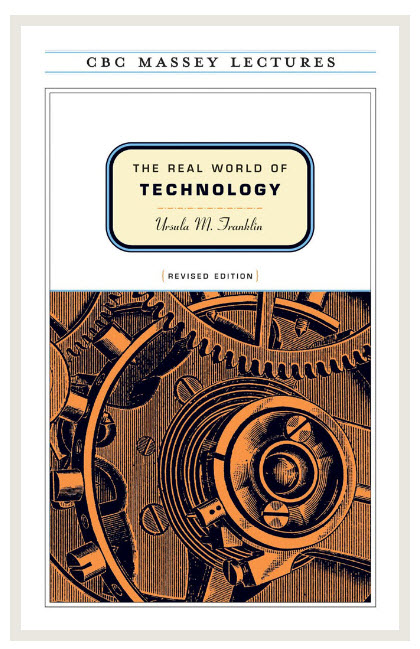Ursula Franklin died last month, in Toronto. She was 94.
Ursula Franklin was a “Canadian giant” for a whole lot of reasons; she was a world-renowned physicist, feminist, Quaker, author, pacifist, professor, Holocaust survivor, public intellectual, mother, and mentor. She was honoured as an Officer of the Order of Canada in 1982 and with the (Canada) Pearson Peace Medal in 2002.
The Real World of Technology
Sad to report, until last week, I hadn’t read her book, The Real World of Technology. Published in 1990, the ideas are largely evergreen; i.e., still bang-on.
 The Real World of Technology was delivered as a series of CBC Massey Lectures. The Massey Lectures are an annual event, a national stage for big thinkers and their ideas, courtesy of Canada’s public broadcaster.
The Real World of Technology was delivered as a series of CBC Massey Lectures. The Massey Lectures are an annual event, a national stage for big thinkers and their ideas, courtesy of Canada’s public broadcaster.
The book “examines the social and political consequences of technology in the “real world”—that is, in our everyday lives. Franklin, an experimental physicist and humanitarian, constructs a criticism of technology that puts the needs of humans ahead of the needs of technology—a stance that ought to be unremarkable, except it isn’t. The lectures are prescient: foreseeing many of the complications of communication technology that predominate present conversations.”
Over the years, I’ve found the CBC Massey Lectures a tremendous pool of ideas and inspiration.
Some of Franklin’s Ideas
People-first technology
Franklin spoke to the sociology and politics of technology.
As Nora Young, host of Spark on CBC Radio (a show dedicated to tech trends, ideas), says:
“She really looked at the way power weaves its way through technology…as a set of social practices. …..and that has been something that has really influenced everything that I’ve thought about technology. ….the only thing that makes technology journalism worth doing, to me, is the notion that if we think critically about it and we talk about the politics of it, that we can get better at it and we can democratize technologies and we can think more creatively about their impacts, instead of what we normally do, which is to say ‘well the genie’s out of the bottle! there’s nothing we can do about it now!” So the notion that you could think critically about it and there could be a sociology of technology, a political theory about technology…..but also the fact that she was Canadian and a scientist and a woman, all together, were very powerful for me.”
Technology is a practice
Looking at technology as practice, indeed as formalized practice, has some quite interesting consequences. One is that it links technology directly to culture, because culture, after all, is a set of socially accepted practices and values. Well laid down and agreed upon practices also define the practitioners as a group of people who have something in common because of the way they are doing things. ~ Franklin
Technology tends to reduce or eliminate (human) reciprocity
Whenever human activities incorporate machines or rigidly prescribed procedures, the modes of human interaction change. In general, technical arrangements reduce or eliminate reciprocity. Reciprocity is some manner of interactive give and tack, a genuine communication among interacting parties… design that rules out reciprocity is a continuing form of technologically executed inequality. It has very profound political and psychological consequences… Reciprocity is not feedback. Feedback is a particular technique of systems adjustment. It is designed to improve a specific performance. ~ Franklin
A message for system designers
There’s a real difference between supplementing a rigidly patterned structure with asynchronous activities and substituting synchronous functions by asynchronous schemes. ~ Franklin
The influence of system designers I’ve highlighted before on this blog; e.g., How Government Systems Designers Can Effectively Communicate With Poor People.
“History is not a rerun for slow learners”
Context matters; there are choices to be made, at each turn, always.
Technology is not preordained (what made good sense to the 15th Century Peruvians made not have made good sense to the Romans) … there are choices to be made and I, for one, see no reason why our technologies could not be more participatory and less expert-driven. ~ Franklin
Amen!
“Franklin’s earthworm theory of social change”
Social change will not come to us like an avalanche down the mountain. It will come through seeds growing in well prepared soil – and it is we, like the earthworms, who prepare the soil. We also seed thoughts and knowledge and concern. We realize there are no guarantees as to what will come up. Yet we do know that without the seeds and prepared soil nothing will grow at all… we need more earthworming. ~ Franklin
More about Franklin
I love Franklin’s multi-disciplinary nature, compassion, and the clarity of her thought. This Toronto Star article pays homage her substantial legacy: Ursula Franklin remembered as a pioneer for women, a leader for peace.


[…] For a take on keeping technology real, human, Ursula Franklin was a global role model. […]